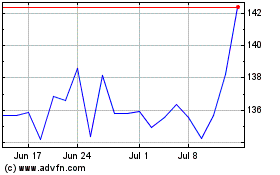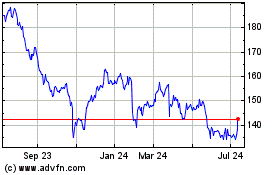UPS Adds Peak Surcharge as Virus Drives Rise in E-Commerce -- Update
May 28 2020 - 4:22PM
Dow Jones News
By Paul Ziobro
United Parcel Service Inc. is adding "peak" surcharges for
companies that have been inundating its delivery network with many
more packages and oversize items during the coronavirus pandemic,
an unprecedented move to manage a summer flood of shipments and
higher costs.
UPS typically imposes extra fees on merchants during the busy
Christmas shopping season, but -- for the first time in the
e-commerce era -- will add such surcharges starting May 31. The
fees would apply to large online sellers like Amazon.com Inc. as
well as traditional retailers like Target Corp. and Best Buy Co.
that have shifted heavily to e-commerce as many stores have closed
temporarily.
Retailers will have to calculate whether to raise prices, absorb
the added cost or a combination of the two. They can also try
workarounds to avoid the fee by closely monitoring the amount and
sizes of packages they ship with UPS, using another carrier or
nudging customers to pick up online orders in stores.
Delivery companies like FedEx Corp., UPS and the U.S. Postal
Service are struggling with an unexpected increase in online
shopping over the past 2 1/2 months as consumers buy online
everything from canned foods and toilet paper to office chairs and
backyard pools. Digital sales at Target and Best Buy more than
doubled in the most recent quarter.
The added volumes are testing the limits of these delivery
networks, which have been operating seven days a week. For FedEx
and UPS, residential deliveries are also less profitable than bulk
shipments to businesses, which have dried up as many offices and
nonessential companies remain closed.
UPS has said it recently has been delivering 70% of packages to
homes, versus about 54% during all of 2019. It has taken on more of
Amazon's package volumes after FedEx cut ties with the online giant
last year.
FedEx recently limited the number of packages that about two
dozen customers including Bed Bath & Beyond Inc., Nordstrom
Inc. and Kohl's Corp. could ship from their stores. Those companies
had repurposed stores into fulfillment centers after they were
forced to shut down temporarily.
FedEx and UPS both have also imposed surcharges on international
packages as a decline in passenger jets has cut into air cargo
capacity. FedEx hasn't added such fees on domestic shipments.
Starting May 31, UPS is adding surcharges on customers whose
weekly volume of shipments using its lower-priced service has blown
through what they were shipping in February.
The surcharge adds 30 cents on each package shipped under UPS
Ground and SurePost, the service in which UPS drops packages at the
Postal Service for delivery to homes. The added fee kicks in only
on shippers that topped their average weekly volume in February by
more than 25,000 packages.
The average revenue per domestic package was $6.44 at UPS in the
first quarter.
Another surcharge adds $31.45 onto each large package shipped,
which could hit items like desks, patio umbrellas and trampolines
that have been popular online purchases during lockdowns across the
U.S. as millions of people work from home, redecorate and try to
entertain their children. That fee would apply to shippers after
they ship more than 500 large packages in a week.
Both surcharges will be in effect until further notice.
A UPS spokesman said the company routinely adjusts prices to
take into account changing market conditions and added costs. "The
peak surcharges reflect the current dynamic market conditions and
uncertainties caused by the coronavirus, which is impacting
available capacity and market demand," the spokesman said.
The fees are likely to hit large shippers the most, rather than
smaller business or occasional shippers. Target, for instance, said
last week that its online order volume more than tripled in April
compared with last year. It rose 141% during the three months that
ended May 2. Amazon's revenue rose 26% in the March quarter from a
year ago, while its world-wide shipping costs rose 49%.
Amazon is slowly returning to normal operations after the
coronavirus-driven surge in demand upended its operations,
prompting the company to limit shipments of nonessential items and
slowed its shipping speeds. On Thursday, the Seattle company said
it plans to keep most of the U.S. jobs it added to meet demand
during March and April.
"All of the large e-commerce shippers are going to get hit with
this," John Haber, CEO of supply-chain consulting firm Spend
Management Experts. "A lot of them will try to negotiate it out,
but there hasn't been a lot of flexibility about not paying these
peak surcharges."
Representatives for Amazon, Target and Best Buy didn't
immediately respond to requests for comment on the UPS
surcharges.
Write to Paul Ziobro at Paul.Ziobro@wsj.com
(END) Dow Jones Newswires
May 28, 2020 16:07 ET (20:07 GMT)
Copyright (c) 2020 Dow Jones & Company, Inc.
United Parcel Service (NYSE:UPS)
Historical Stock Chart
From Mar 2024 to Apr 2024

United Parcel Service (NYSE:UPS)
Historical Stock Chart
From Apr 2023 to Apr 2024
